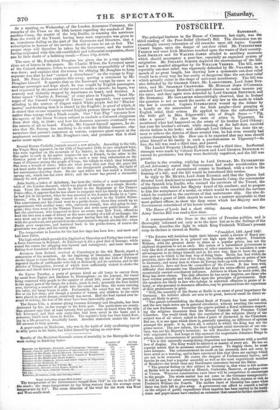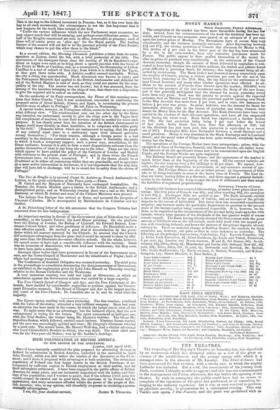A correspondent who lives in the midst of Prussian politics,
and is thoroughly informed not only as to the facts but as to the feelings of the German; describes the light in which King Frederick William's present coup de theatre is viewed at Berlin. " Frankfort, 13th April 1847.
"The Estates will doubtless begin their labours under a shower of Royal pro- mises. But expectation is in general not high upon this subject. Frederick William, with the greatest desire to shine as a popular prince, has not the slightest disposition to act as such. His notion of a naturalized government is very like that of some modern statesmen of other countries: he considers it more advantageous to do things himself, and in his own way, than to leave the sues- lion open as to which is the best way of doing them. Berlin has had within* precincts, since the first year of his reign, the leading authorities on points of law in Germany, and many men to whom all Europe looks up with reverence. These men, however, have not been the councillors of the Crown. It has been with difficulty that Alexander von Humboldt has kept his extra-official ground, and occasionally exerted conciliatory influence. Advisers to whom he must defer, the King has never chosen. The only offenders he has never forgiven, are those who have written pointedly and with effect upon the principles of government. How the speakers are likely to fare who indulge in oratorical effusions in praise of li- berty, or who presume to denounce offenders, may be presumed from the experience of their predecessors in print.
"Still, the assembly of the States at Berlin is an event of great importance for Germany. Its indirect effects are seen to be great, however small its direct re- sults are likely to prove. "The patent reestablishing the Royal Bank of Prussia has been carried out, and the new bank-notes are in general circulation without awaiting the sanction of the new Parliament. Yesterday the papers publish a Royal ordinance respect- ing the religious dissenters from the Roman Catholic and Prussian United Churches. One would think that the regulation of the religions liberty of the subject was of all others suited to form a point of discussion in the Chambers. But no; it is one upon which there is, generally speaking, no difference of opinion amongst the people: it is above all, a subject in which the King was not the prime mover. The new reform, the most important social movement of our cen- tury, was not his Majesty's invention: he will therefore never forgive the man who originated it; and keeps at this moment the respectable Johannes Ronge in prison, under circumstances of peculiar harshness. "Yet is this naturally monopolizing disposition not inconsistent with a morbid love of display. The King would be admired as master of every art. He has an especial notion that he possesses oratorical powers. To display them, he must have listeners. The commencement he made on his accession does not seem to have acted as a warning, and to have convinced him that there are sayings which are not to be retracted. He scorns the dangers of Parliamentary tactics, and fancies he can lead a popular assembly as well as the most experienced member of Brooks'is—far better than any Doctrinaire statesman beyond the Rhine.
"The general feeling on this subject in Germany is, that what is left undone at Berlin will be accomplished at Munich, Carlsruhe, Hanover, or perhaps even at Vienna. Wherever constitutions exist there will be competition in concessions to the people. The whole matter has not come to the Germans unexpectedly. It will be easy for other sovereigns to gain laurels at as little expense or risk as Frederick William the Fourth. The sudden burst of liberality has come when there was little left to give away. A government can afford to consult a nation on the subject of public expenditure when taxation has been carried to its maxi- mum and paper issues have reached an extension that cannot be further stretched.
This is the key to the Liberal movement in Prussia; but, as it has ever been the key to all such movements, the circumstance is not the less important that it now happens for the tenth time instead of the first.
"Under the various influences which the new Parliament must encounter, we may expect much that will be amusing, and perhaps some ridiculous scenes. One half of the Knights summoned are men in office, removeable at pleasure; each of these will of course prove an alter ego' for the Royal patron. The leading feature of the session will not fail to be the personal activity of the First Estate; which may chance to put the other three to the blush."



























 Previous page
Previous page